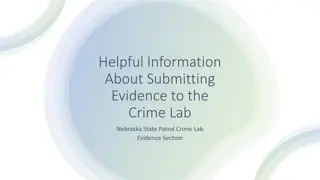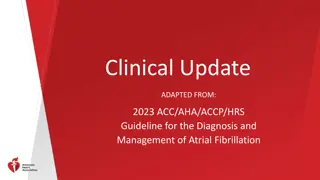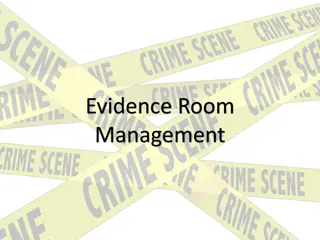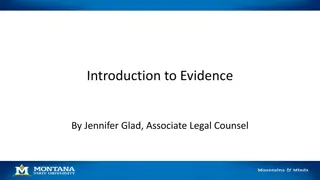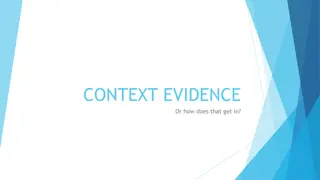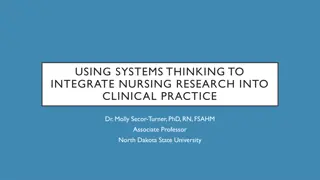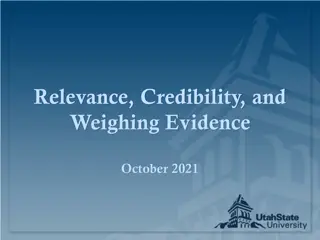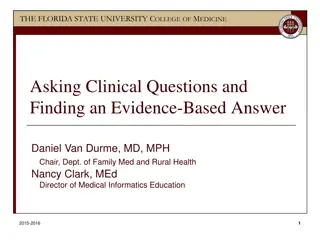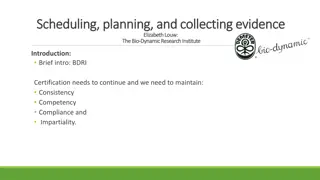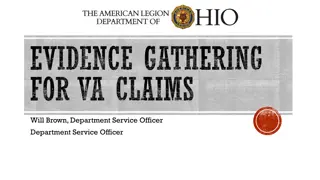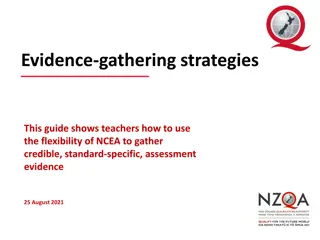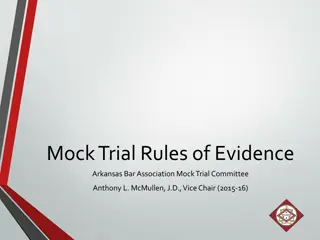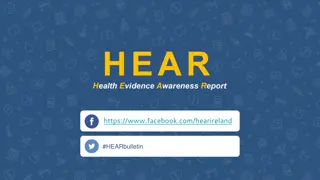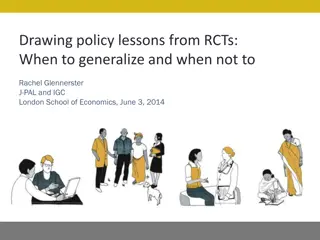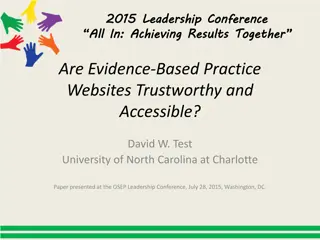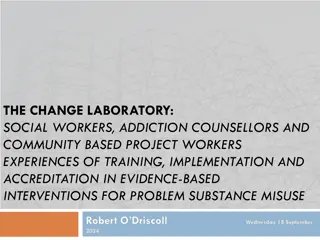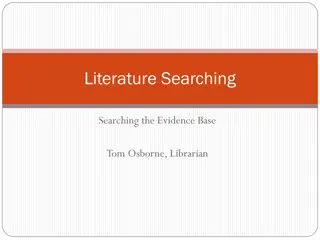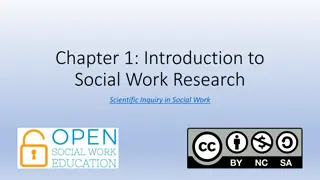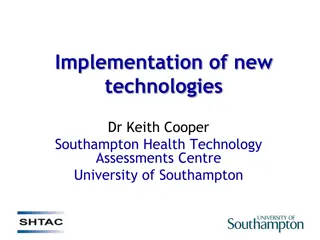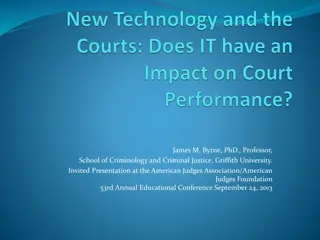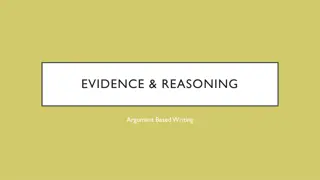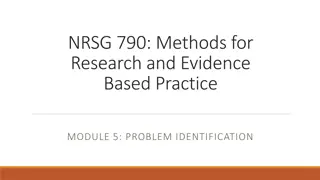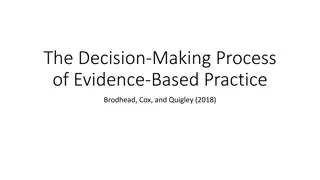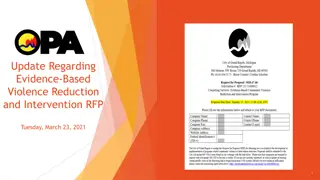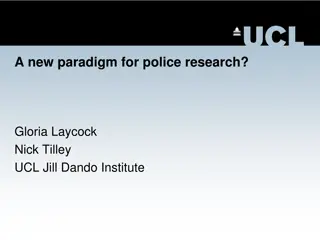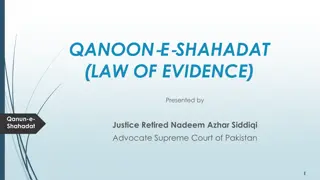The Role of Artifacts and Evidence in Educator Evaluation and Support
Exploring the role of artifacts and evidence in educator evaluation, this content covers the three categories of evidence required by the Oregon Framework. It delves into the efficient process that reduces redundancy, essential components of SLG goals, and the types of evidence relevant to professio
0 views • 15 slides
Understanding Impression Evidence Collection in CSI Investigations
Impression evidence plays a crucial role in investigations, including shoeprints, tool marks, tire tracks, bite marks, and riffling marks on bullets. This evidence can be collected in 2D using photography or tape lifts, and in 3D through casting methods. Differentiating between class and individual
0 views • 21 slides
Helpful Information About Submitting Evidence to the Crime Lab.
Helpful information about submitting evidence to the Nebraska State Patrol Crime Lab's Evidence Section. Learn about the NSP 750 Evidence Submittal Form, submission process, and guidelines for resubmissions. Ensure all necessary details are provided for proper analysis of evidence.
5 views • 16 slides
Illegally obtained evidence
Illegally obtained evidence refers to evidence acquired through unlawful means, such as searches without warrants or extraction under duress. The Fruit of the Poisonous Tree doctrine renders evidence inadmissible if derived from illegally obtained evidence. The Exclusionary Rule prohibits the use of
2 views • 30 slides
Clinical Update
This clinical update provides recommendations for the diagnosis and management of atrial fibrillation adapted from the 2023 ACC/AHA/ACCP/HRS guidelines. It includes information on class strength of recommendations, levels of evidence, and phrases for writing recommendations based on the quality of e
1 views • 46 slides
Evidence Room Management
Explore the intricacies of evidence room management in a law enforcement setting, including the roles of individuals like Greg Van Buskirk, differences in crime scene management between large and small departments, the distinction between property and evidence, the importance of maintaining chain of
0 views • 8 slides
Understanding Evidence in Investigations
Learn about the principles and types of evidence in investigations, including inculpatory and exculpatory evidence, physical, documentary, demonstrative, and verbal evidence. Explore sources of evidence and the significance of collecting relevant information to ensure a fair investigative process.
0 views • 14 slides
Understanding Context Evidence in Legal Proceedings
Context evidence in legal proceedings refers to evidence of acts not charged in the indictment, used to provide a background for understanding specific allegations. This type of evidence is often relied upon by the prosecution to explain events or behaviors that may seem isolated or surprising. It i
1 views • 13 slides
Integrating Nursing Research into Clinical Practice with Systems Thinking
Dr. Molly Secor-Turner emphasizes the importance of evidence-based practice (EBP) in nursing. EBP, derived from rigorous research, leads to quality patient outcomes by aligning services with current knowledge. The process involves identifying problems, critiquing evidence, implementing recommendatio
0 views • 21 slides
Empowering Health Decisions and Care through OHDSI Community Collaboration
OHDSI's mission revolves around improving health by empowering a community to generate evidence that enhances health decisions and care. The journey to real-world evidence involves leveraging patient-level data in source systems and establishing reliable evidence. The OHDSI community is dedicated to
0 views • 5 slides
Understanding Evidence-Based Medicine and Clinical Decision-Making
European Patients Academy on Therapeutic Innovation emphasizes the importance of Evidence-Based Medicine (EBM) in providing optimum clinical care. EBM involves systematic review and utilization of clinical research for informed decision-making, benefiting patients in disease management and treatment
7 views • 20 slides
Understanding Relevance, Credibility, and Weighing Evidence in Decision-Making
Explore the importance of relevance and credibility in evidence assessment, the role of hearing panels in evaluating evidence fairly, and the responsibilities they hold. Learn about presenting relevant evidence, policy analysis, and identifying irrelevant evidence to ensure a thorough review process
6 views • 32 slides
Clinical Question Formulation in Evidence-Based Medicine at The Florida State University College of Medicine
Learn the essential steps in formulating clinical questions in evidence-based medicine at The Florida State University College of Medicine. Understand the distinction between background and foreground questions, PICO format, and the multi-step EBM process. Enhance your ability to find evidence-based
0 views • 22 slides
Mastering Claims, Evidence, and Warrants for Persuasive Writing
Understanding the concepts of claims, evidence, and warrants is crucial for constructing persuasive arguments. Claims represent positions to persuade, evidence supports claims with facts, and warrants bridge the gap between evidence and claims. An exercise is outlined to help practice forming claims
0 views • 8 slides
Understanding Biased Assimilation and Attitude Polarization in Social Disputes
People with strong opinions on complex social issues tend to interpret evidence in a biased manner, accepting confirming evidence readily while subjecting disconfirming evidence to critical evaluation. This can lead to increased polarization rather than narrowing of disagreement when exposed to the
0 views • 20 slides
Transformation of Quality Assessment Framework in Healthcare
The healthcare quality assessment framework is evolving with a new strategy focused on data-led, people's experiences, care integration, and safety culture. The current framework is transitioning towards a new approach by late 2023, incorporating separate registration and monitoring processes, five
0 views • 14 slides
Managing Documentary Evidence Challenges in Certification Processes
Addressing the challenges in collecting and reviewing documentary evidence for certification processes, this content discusses the need for adaptability, verification methods, and system development to ensure integrity without compromising compliance. Elizabeth Louw from the Bio-Dynamic Research Ins
0 views • 10 slides
Understanding Circumstantial Evidence in Legal Proceedings
Circumstantial evidence plays a crucial role in legal proceedings, allowing one to infer facts based on surrounding circumstances rather than direct proof. This type of evidence can be powerful in establishing the guilt or innocence of a person accused of a crime, complementing direct evidence for a
0 views • 39 slides
Understanding Evidence Gathering for VA Claims with The American Legion Department of Ohio
Evidence is crucial for VA claims, and it can come in various forms such as documents, written statements, photos, and video recordings. The framework for evaluating evidence includes factors like relevance, competence, credibility, and weight. Understanding the types of evidence, forms of relevance
0 views • 14 slides
NCEA Evidence-Gathering Strategies for Teachers
This guide explains how teachers can use the flexibility of NCEA to gather credible assessment evidence, tailored to meet student needs. It emphasizes the importance of integrating assessment with learning, producing valid evidence, and ensuring fairness and transparency in assessment practices. Tea
0 views • 19 slides
Understanding Mock Trial Rules of Evidence
Mock Trial Rules of Evidence are crucial for determining the admissibility of testimony and evidence in a trial setting. Students preparing for cases need to assess evidence admissibility, make timely objections, and be prepared to defend testimony. The rules cover objections, specific objections ty
0 views • 36 slides
Collaborative Efforts of Irish Health Librarians in Providing Evidence-Based Practice Support
Current awareness newsletter freely available on the internet, providing high-quality, relevant information to healthcare professionals and consumers. This collaboration of Irish health librarians aims to promote evidence-based practice by offering up-to-date information and resources. The conscient
0 views • 12 slides
Making Informed Policy Decisions: Lessons from Randomized Controlled Trials
Policy makers face challenges in decision-making without complete evidence. Drawing on a Bayesian approach to evidence, combining different forms of evidence, and considering contextual factors can aid in designing effective policy interventions. Case studies like non-cash incentives for immunizatio
0 views • 18 slides
Evaluating Trustworthiness and Accessibility of Evidence-Based Practice Websites
This paper discusses the importance of using online resources for accessing evidence-based instructional practices in education. It highlights the challenges educators face in finding trustworthy and accessible websites for reliable information. The session goals include providing administrators wit
0 views • 10 slides
Experiences of Training and Implementation in Evidence-Based Interventions for Substance Misuse
This study explores the experiences of social workers, addiction counselors, and community-based project workers in training, implementing, and accrediting evidence-based interventions for problem substance misuse. The research delves into the challenges faced, including funding for accreditation, a
0 views • 23 slides
Understanding Programs and Processes in Operating Systems
Exploring the fundamental concepts of programs and processes in operating systems, this content delves into the definitions of programs and processes, the relationship between them, the components of a program, what is added by a process, and how processes are created. The role of DLLs, mapped files
0 views • 22 slides
Effective Literature Searching for Evidence-Based Medicine
Learn about effective literature searching techniques for evidence-based medicine, including library resources, search strategy development, access via OpenAthens, and utilizing the PICO approach for structured searches. Discover how to formulate searches, register for OpenAthens, and navigate libra
0 views • 15 slides
Understanding Social Work Research and Evidence-Based Practice
Explore the significance of social work research, cognitive biases, objectivity vs. subjectivity, and evidence-based practice. Learn how social workers gather knowledge, apply cognitive biases, distinguish between subjective and objective truths, and utilize evidence-based practice to enhance client
0 views • 9 slides
Evidence-Based Decision Making for Health Technology Implementation
The implementation of new technologies in healthcare must be evidence-based and cost-effective. Health Technology Assessment (HTA) plays a crucial role in evaluating the effectiveness, cost, and comparative benefits of various health technologies. Organizations like NICE provide guidance based on cl
0 views • 17 slides
Advances in Court Technology: Enhancing Evidence-Based Corrections
Explore the impact of new technology on crime, law, and social control, focusing on innovative court technology advancements in crime prevention, policing, courts, corrections, and community safety. Delve into the Global Centre for Evidence-based Corrections and Sentencing's initiatives, including h
0 views • 40 slides
Practice and Procedure in Judicial Review: Factual Evidence and Interveners
The content provides valuable insights into the practice and procedure regarding factual evidence and interveners in judicial review cases. It covers general rules, recent cases, applications for oral evidence, questioning witnesses, opinion evidence, and the role of interveners. Key points include
0 views • 28 slides
National Elf Service Launches to Revolutionize Access to Healthcare Evidence
The National Elf Service is introduced as a groundbreaking initiative to address the challenges in accessing and staying updated on healthcare evidence. It aims to combat misinterpretations and gaps in evidence, offering a reliable platform for professionals to stay informed. Through a series of inf
0 views • 14 slides
Effective Argumentation in Writing: Evidence and Reasoning
A comprehensive guide on utilizing evidence and reasoning in argument-based writing. Learn how to incorporate facts, quotes, and statistics from reliable sources to support claims, and how to analyze and explain the evidence to strengthen your arguments. Examples illustrate the importance of evidenc
0 views • 5 slides
Research Methods and Evidence-Based Practice for Problem Identification
This module focuses on problem identification in research and evidence-based practice, emphasizing the importance of identifying the problem before seeking a solution. It covers components of the PICO framework, constructs well-built clinical questions, and provides examples related to hospitalized
0 views • 6 slides
Understanding Evidence-Based Practice in Behavior Analysis
Definitions and analogies from the field of medicine help clarify the concept of Evidence-Based Practice (EBP) in Behavior Analysis. EBP involves integrating current best evidence with clinical expertise and client values to make informed decisions. The three-legged stool analogy illustrates the imp
0 views • 32 slides
Update on Evidence-Based Violence Intervention RFP Process
The City of Grand Rapids initiated an RFP process to implement an evidence-based violence reduction program, involving a review committee that assessed proposals based on established models. The committee decided to re-release the RFP with a focus on an evidence-based intervention model, ultimately
0 views • 6 slides
Structural Coupling between Science and Politics in Evidence-Based School Reform
This article by Gita Steiner-Khamsi explores the interplay between science and politics in evidence-based school reform, focusing on global public goods and the use of data and evidence in policy planning. It discusses the challenges and promises of evidence-based approaches, highlighting the comple
0 views • 17 slides
New Paradigms in Police Research: Methodological Implications and Future Directions
Policing is evolving towards professionalism and evidence-based practices. However, there is a scarcity of research on effective strategies, highlighting the need for relevant, accessible evidence. The EMIE framework (Effects, Mechanisms, Moderators, Implementation, Economy) aids in assessing eviden
0 views • 22 slides
Results First Initiative Overview: Informing Evidence-Based Decision-Making in Minnesota
The Results First Initiative in Minnesota partners with various stakeholders to identify services offered, anticipate outcomes, and inform decision-making processes by producing evidence-based information. Stakeholders include agencies, counties, providers, and key partners like community groups and
0 views • 28 slides
Understanding Qanun-e-Shahadat: Law of Evidence in Pakistan
Qanun-e-Shahadat Order 1984 replaced the Evidence Act of 1872 in Pakistan, aiming to align the law of evidence with Islamic principles. This law is crucial for judicial proceedings, governing the admissibility of oral and documentary evidence, primary and secondary evidence, and resolving conflicts
0 views • 22 slides


